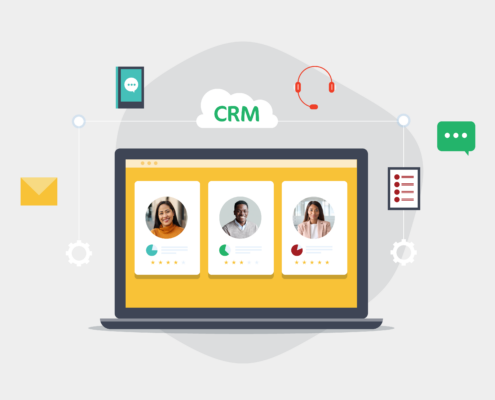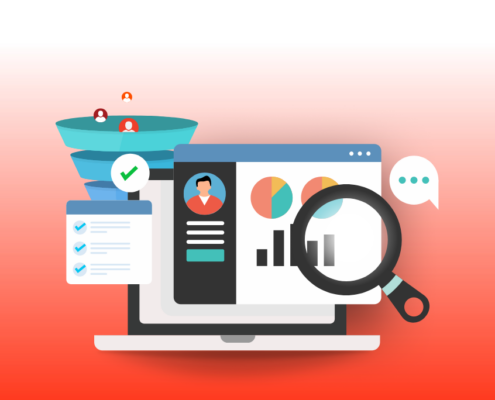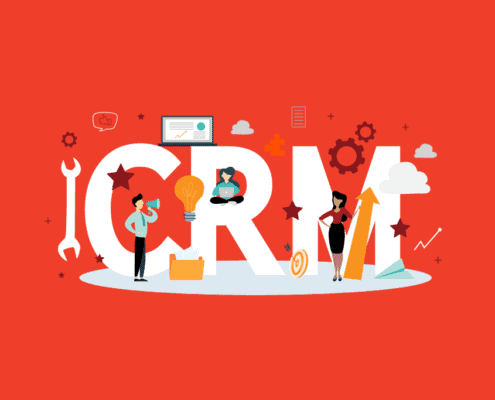

A strong client base is the foundation of every successful business. When customers are satisfied with the products and services you render, this not only increases the likelihood of repeat purchases, but it also builds trust. And eventually, those buyers become ambassadors of your brand who recommend you to new clients.
This is the ideal outcome for every salesperson.
However, as we know too well, this isn’t always the case. It takes a significant amount of effort and perseverance—not to mention a hint of luck—to make sure every process runs smoothly. Thankfully, though, there’s a better way.
With a CRM system, your sales and marketing team increases the likelihood to convert from a lead into a long-term customer. In this article, we’ll highlight the following topics:
Definition of a CRM System
A customer relationship management (CRM) system is a software that streamlines procedures and engagement between a business and its customers.
While solutions like this have been around since the early 1990s, businesses have only recently recognized its value. Managing leads from social media, keeping track of current orders, organizing meetings, and analyzing emails can all be overwhelming, especially when they’re all happening at the same time. Using a customer relationship management software will help you put things in order, so you can focus on other, more pressing tasks.
Different Types of CRM Systems
A CRM program is perhaps the most widely used software to date. Its applications go beyond just one aspect of business, which is why there are already several types of CRM available.
Let’s go through the characteristics of each one:
Operational
Operational CRMs automate a variety of essential processes in your business, such as setting appointments, sending emails, and collecting important customer information. This can also be synced to your brand’s social media accounts so that system-generated messages are sent when inquiries are submitted outside of traditional office hours.
In addition, some CRM systems are even equipped with a data cleansing protocol. This protocol skims through your customer database to address irregularities, missing info, or anything that’s outdated. Then, the system prompts you on the following steps.
Analytical
Analytical CRMs browse through conversations with potential clients to identify which lead is closest to the end of the purchasing funnel. This tool also studies consumer interests, preferences, contact details, and the most typical points of contact. From here, the CRM generates useful trends.
After this is all laid out, your team should have a thorough understanding of your target audience, how to communicate with them, and what they are interested in.
Campaign-Driven and Lead Generation
Campaign-driven and lead generation CRMs act like a progress-tracking tool that monitors and collates updates so you know what’s happening at any given time.
Campaign-related CRM software can be linked to your various sales channels, including social media pages, email addresses, and websites. Each time a potential buyer reaches out, the program automatically puts your plan into motion, sending out replies and gathering and analyzing data.
All of this is done meticulously, step by step, until the campaign period is over. This allows your responsibilities to shift away from overseeing everything, allowing more time for strategizing and establishing an overall direction.
Strategic
Last but certainly not least, as an avid Salesforce user, you have to be completing certain maintenance tasks each year. The following tasks will take a few days max and should be completed every year:
- Create an archive of all the system’s field history tables to ensure you have an audit trail that goes longer than one year
- Archive or purge documents, emails, and tasks to reduce storage charges in your system
- Archive Salesforce Chatter histories (in case of audits and for compliance reasons)
- Update system road maps (add in summaries about upgrades and new features that are needed to achieve business goals)
Synergetic
Synergetic CRMs simplify inter-department communication, providing a single venue for your team to process requests and provide updates.
For example, when an order is confirmed by a customer, your sales team can simply input a new job request. The system immediately sends out notifications to the operation, production, and procurement departments to jumpstart their functions. They’ll likewise be given access to inform everyone once tasks are completed.
This back-end support system is crucial when keeping your customers in the loop. With it, they’ll feel prioritized and taken care of. You can also stay one step ahead of problems before they even happen.
However you need to use your CRM, the experts at Abstrakt Cloud know just how to configure your CRM to fit everyday business functions. Learn more about our CRM integration services here.
Benefits of Using a CRM System
Is having a CRM system absolutely necessary for your business? No; however, a CRM simplifies complicated procedures and makes them a lot more manageable. To put things into perspective, here are some benefits of using a CRM system:
Improves Customer Experience
As a business owner, keeping your customers happy is important. A CRM tool helps you keep up with ever-changing trends and better understand the specific needs of your customers. This will help you create the best possible experience for them.
Not only that, but your entire team working as one cohesive unit will further improve your level of service. For example, operational and strategic CRMs automate tasks, streamline communications, and significantly minimize delays.
Opportunity To Tap Into New Markets
For many of us, there’s a pressing need to expand our current client base. But where do we even begin?
Customer relationship management tools help by dissecting your existing buyer profile. They identify information like buying patterns, pain points, needs, and wants to create a general persona of who could benefit from your products.
Using that data, a CRM then recommends some other niches you can tap into, which includes emerging or alternative markets in your industry. The software also comes up with the best ways to interact with them.
Analyzing all of this information is crucial when plotting a direction for your business. And since you and your manager might not have the time for it anymore, outsourcing to someone—or something—might not be the worst idea.
Saves Time and Money
Purchasing and implementing a CRM won’t come cheap; however, it is a reasonable investment. In the long run, you’ll end up spending less on wages, shipping delays, and missed opportunities.
Tools like a CRM system allow you to modernize different business processes. Rather than paying a whole team to set appointments, consolidate reports, and send out emails, just one or two people will be enough. In addition, a CRM can help you get things done at a much faster rate.
A customer relationship management program can also strengthen the coordination among teams within your company. Providing a singular avenue to share updates and assign tasks means fewer things will fall through the cracks. And as less issues are faced, more business is brought in.
Streamlines Strategies for Current Consumers
Gathering information isn’t just for new clients. It can be used for introducing new ideas to enhance your existing group of buyers and, subsequently, their spending capacity. Remember, sales and marketing is all about building long-lasting relationships with new and long-term customers.
Knowing your customers on an even deeper level will optimize your campaigns and make them more relatable. CRMs can be synced to all outbound channels, too, so this helps you collect necessary feedback. In the end, this will prove useful when rolling out new innovations and maintaining relevance in the eyes of your consumers.
Oversees Every Initiative
As a business owner, you can’t keep an eye on every single aspect of your company’s operations. However, a CRM gives you insight into important data that can be used before making an executive decision.
In the same way, having all your managers share updates on every transaction is crucial not just for troubleshooting, but for further evaluations as well. And while you may not read them on a real-time basis since they’re stored in the system, you’ll have the option to catch up later on.
What To Consider When Investing in a CRM
For many, shifting their business processes from traditional methods to customer relationship management software is a big step. Before making that decision, here are a few factors you might want to consider. These should help you determine whether a CRM is necessary or just a luxury at this point:
Budget
Fully customized customer relationship management programs are expensive, so you’ll need to take a hard look at your cash flow and see if a CRM is something you can afford.
Services like this are typically offered on a subscription basis. On average, the monthly fee is between $50 to $150. More complex variations go for as high as $400 a month.
Companies also have the option to purchase their own software, but that can cost anywhere from $10,000 to $50,000, plus annual maintenance expenses. This is mainly viable for large corporations that need to personalize several features to precisely match their needs.
In most cases, paying a monthly fee is reasonable enough. Compare it to your potential savings and earnings to see if it’s worth pursuing. Several service providers offer a free trial package before asking you to make a long-term commitment, which is also something to consider.
Pain Points
The second factor to reflect on is the challenges your company is facing. Where do delays usually happen, and what’s the cause? When interacting with clients, what issues does your sales team most often experience? Those can be indicators of whether a CRM is needed.
Identifying your company’s issues will give you a better idea of which customer relationship management software you need. For example, if your marketing initiatives aren’t achieving the desired results, an analytical CRM makes the most sense. It can provide the necessary information to streamline campaigns, re-assess strategies, and get to know your target audience on a deeper level.
On the other hand, if lags occur due to miscommunication among departments, a synergetic or operational program would prove more valuable. Automating several steps in your routine should eliminate superfluous spending and improve your response time to customer inquiries.
Business Goals
Knowing your business goals by heart is valuable. Initiatives, especially those that cost as much as CRMs, need to yield a subsequent return on investment (ROI).
If your company is at a point where it needs to reach new networks, spending on a customer relationship management tool makes sense. It’ll expedite growth by reaching new clients, optimizing strategies, and reducing costs. In terms of your employees, modernizing processes should make their lives easier, allowing them to focus on other, more crucial tasks that bring in more profit.
Incorporating a CRM is more about long-term growth than short-term satisfaction in terms of both adjustment and savings. It’ll probably take a couple of months before you begin seeing the positive effects. So be sure to also consider the acclimation period and whether your company can take on the challenge.
To learn more about how to use CRM software like Salesforce to maximize sales, marketing, and lead generation efforts, read our blog here.
CRM Frequently Asked Questions (FAQs)
For those who still need some clarification, we’ve compiled a list of the most frequently asked questions on the topic. Hopefully, this will shed more light on what CRMs are all about.
What Departments Benefit From CRM Software?
Primarily, it’s your sales and marketing divisions that will experience the most positive effects. But because of the way CRMs simplify processes and inter-department communication, they can help build a collaborative culture within any department. The information a CRM interprets will also prove useful for your operations, merchandising, production, and procurement units.
How Much Does CRM Software Cost?
This will greatly depend on what features it includes. Is it just one type of CRM or a hybrid that offers several functions? If it’s the latter, a reasonable monthly fee would be $200. Medium-sized enterprises with more complex procedures in place should find that amenable.
Startups that are looking to establish their business processes early on can make do with entry-level options and then upgrade later on. That’s another wonderful thing about these tools—they’re easy to add onto.
When Should My Business Start Using a CRM?
Ideally, it would be best to incorporate this setup during the infancy stage, when everything is still being put into place. At this phase, the level of adjustment required is minimal.
Nevertheless, it’s never too late to make improvements to your business. Even companies that have been around for decades have still made the change, particularly to keep up with today’s evolving technologies.
Just remember that it’s always more difficult to relearn something. So while it’s not impossible, a late change won’t be a walk in the park either.
Key Takeaways
Without a doubt, customer relationship management tools offer tremendous benefits to companies. A CRM allows organizations to automate several parts of their business, collect pertinent data for implementation, and take advantage of opportunities to meet new clients in new niches.
Although a CRM isn’t always easy to integrate into your daily routines, we always recommend that company decision-makers at least consider it, especially those looking for consistent growth. If you’re currently in the market for CRM software, contact the sales reps at Abstrakt Marketing Group, a trusted leader in Salesforce implementation, consulting, and integration.




